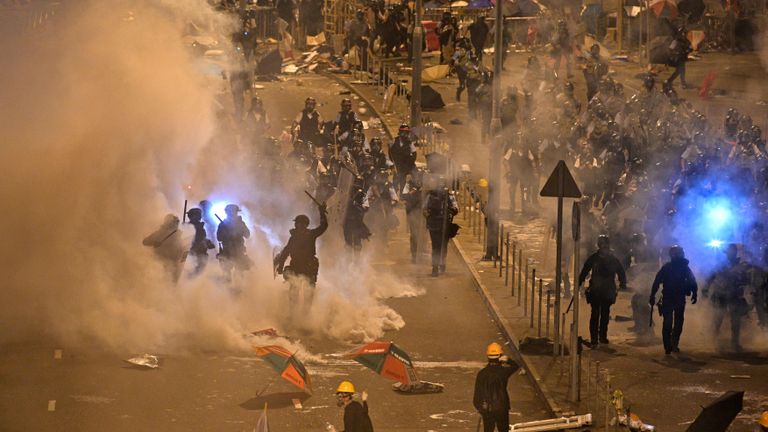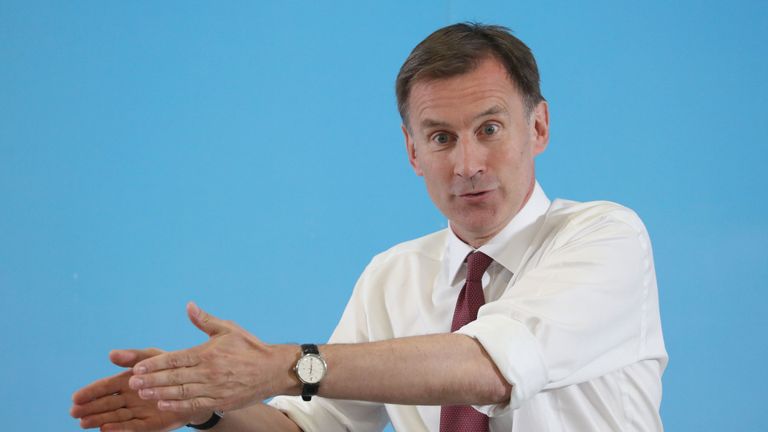Hong Kong protest leader defends 'teammates' over invasion of government building
Calm descended on the city hours after police fired tear gas to disperse hundreds of protesters who had stormed the legislature.
Tuesday 2 July 2019 18:38, UK
An activist spearheading protests in Hong Kong has defended "teammates" who stormed a government building in the city, as he warned opposition to a controversial extradition bill was far from over.
Hundreds of demonstrators stormed the legislature on Monday as anger over the government proposal spilled over, with calm only restored after police wrestled back control overnight.
The chaotic scenes came on the 22nd anniversary of the former British territory being returned to China, with those who managed to break into the building seen tearing down portraits and spray-painting pro-democracy slogans in the main chamber during a three-hour occupation.
Joshua Wong, who was jailed for his role in the 2014 Umbrella Movement in the territory, told Sky News that protests would continue until the bill is formally withdrawn.
"People stormed into the legislative council because they fear that the extradition bill might be reactivated in the legislative process in the next 12 months," said the 22-year-old.
"We had the largest demonstration in the past two centuries of Hong Kong but the government ignores our words."
The extradition proposal has heightened fears of eroding freedoms in the territory and further debate on the measure has been suspended indefinitely.
But that is not enough for the protesters, who want the bill formally withdrawn so that there is no chance of it being revived before it expires at the end of the current legislative session in July 2020.
The protesters also want leader Carrie Lam - who is not directly elected - to stand down.
She has pledged to be more responsive to public sentiment after facing criticism for trying to push the legislation through, but used a 4am news conference to criticise those who broke into the government building.
Mr Wong told Sky News: "Carrie Lam will condemn anything other than herself. I did not see any activists trying to physically assault police officers.
"The only goal for them was to enter the chamber of the legislative council and make people aware that it is not democratically elected - it just serves the interests of Beijing."
China has largely sought to downplay the recent demonstrations, with a series of rallies and marches attracting millions of people, but state media has condemned those who broke into the legislature.
Global Times, the official Communist Party newspaper, said: "These violent assailants in their arrogance pay no heed to Hong Kong's law, no doubt arousing the anger and sadness of all people of the city of Hong Kong."
Footage that was broadcast on Chinese TV showed police moving into roads surrounding the building, where protesters smashed through glass and metal barriers.
Police initially retreated and gave the protesters the run of the building before announcing a crackdown, and hundreds of officers arrived with riot shields before firing tear gas at protesters.
Eventually roads near the heart of the financial centre were cleared, paving the way for business to return to normal, but government offices remained closed on Tuesday morning.
There were no immediate reports of injuries, but arrests are expected and Mr Wong told Sky News he was worried that some could face charges that result in 10 years behind bars.
British Foreign Secretary Jeremy Hunt has said he was "dismayed" by the violence he saw, but warned authorities not to resort to "repression" to quell further unrest.
He said: "I can understand the concerns people in Hong Kong had about those extradition laws.
"The success of Hong Kong is based on a strong business culture, underpinned by basic freedoms. We condemn the violence we saw last night, and that is never acceptable, but we understand the deep-seated concerns that people have about their freedoms and why they would want to march."
Mr Hunt refused to comment on whether or not Ms Lam should stand down, but warned of "serious consequences" if the system agreed between China and Britain for governing Hong Kong was undermined.
He said the UK stands behind the "One Country, Two Systems" relationship between the territory and China, which came as a result of the Sino-British Joint Declaration signed in 1984.
China has previously scolded other countries for commenting on the protests.
Foreign ministry spokesman Geng Shuang said: "Hong Kong affairs are purely China's internal affairs, and no foreign country has the right to intervene."
Of the events at the legislature, he added: "The violent attacks are serious illegal acts that trample on the rule of law and endanger social order. We strongly condemn it."
The violence on Monday forced organisers of a separate peaceful march against the extradition bill to change the endpoint of their protest from the legislature to a nearby park.
Police estimated that 190,000 people joined the march, the third major one in as many weeks, but organisers put the number at 550,000.















